
Concepts and Fuzzy Logic
Seiten
2011
MIT Press (Verlag)
978-0-262-01647-6 (ISBN)
MIT Press (Verlag)
978-0-262-01647-6 (ISBN)
- Titel ist leider vergriffen;
keine Neuauflage - Artikel merken
Leading researchers examine the usefulness and limitations of fuzzy logic for the psychology of concepts.
The classical view of concepts in psychology was challenged in the 1970s when experimental evidence showed that concept categories are graded and thus cannot be represented adequately by classical sets. The possibility of using fuzzy set theory and fuzzy logic for representing and dealing with concepts was recognized initially but then virtually abandoned in the early 1980s. In this volume, leading researchers-both psychologists working on concepts and mathematicians working on fuzzy logic-reassess the usefulness of fuzzy logic for the psychology of concepts.
The book begins with two tutorials-one on concepts and the other on fuzzy logic-aimed at making relevant experimental and theoretical issues accessible to researchers in both fields. The contributors then discuss the experiments that led to the rejection of the classical view of concepts; analyze the various arguments against the use of fuzzy logic in the psychology of concepts and show that they are fallacious; review methods based on sound measurement principles for constructing fuzzy sets; introduce formal concept analysis and its capabilities when generalized by using fuzzy logic; consider conceptual combinations; examine lexical concepts; and propose a research program based on cooperation between researchers in the psychology of concepts and fuzzy logic.
The classical view of concepts in psychology was challenged in the 1970s when experimental evidence showed that concept categories are graded and thus cannot be represented adequately by classical sets. The possibility of using fuzzy set theory and fuzzy logic for representing and dealing with concepts was recognized initially but then virtually abandoned in the early 1980s. In this volume, leading researchers-both psychologists working on concepts and mathematicians working on fuzzy logic-reassess the usefulness of fuzzy logic for the psychology of concepts.
The book begins with two tutorials-one on concepts and the other on fuzzy logic-aimed at making relevant experimental and theoretical issues accessible to researchers in both fields. The contributors then discuss the experiments that led to the rejection of the classical view of concepts; analyze the various arguments against the use of fuzzy logic in the psychology of concepts and show that they are fallacious; review methods based on sound measurement principles for constructing fuzzy sets; introduce formal concept analysis and its capabilities when generalized by using fuzzy logic; consider conceptual combinations; examine lexical concepts; and propose a research program based on cooperation between researchers in the psychology of concepts and fuzzy logic.
Radim Belohlavek is Professor of Computer Science at Palacky University in Olomouc, Czech Republic. George J. Klir is Distinguished Professor Emeritus at Binghamton University. Radim Belohlavek is Professor of Computer Science at Palacky University in Olomouc, Czech Republic. George J. Klir is Distinguished Professor Emeritus at Binghamton University. Eleanor Rosch is Professor of Psychology at the University of California, Berkeley.
| Reihe/Serie | Concepts and Fuzzy Logic |
|---|---|
| Zusatzinfo | 7 figures, 6 tables |
| Verlagsort | Cambridge, Mass. |
| Sprache | englisch |
| Maße | 152 x 229 mm |
| Gewicht | 544 g |
| Themenwelt | Geisteswissenschaften ► Philosophie ► Logik |
| Geisteswissenschaften ► Psychologie ► Allgemeine Psychologie | |
| Geisteswissenschaften ► Psychologie ► Biopsychologie / Neurowissenschaften | |
| Geisteswissenschaften ► Psychologie ► Verhaltenstherapie | |
| Mathematik / Informatik ► Mathematik ► Logik / Mengenlehre | |
| ISBN-10 | 0-262-01647-8 / 0262016478 |
| ISBN-13 | 978-0-262-01647-6 / 9780262016476 |
| Zustand | Neuware |
| Haben Sie eine Frage zum Produkt? |
Mehr entdecken
aus dem Bereich
aus dem Bereich
ein Gegenentwurf zum kurzfristigen Denken : so werden wir zu den …
Buch | Hardcover (2023)
REDLINE (Verlag)
CHF 27,90


